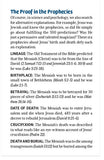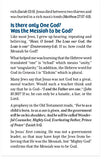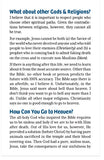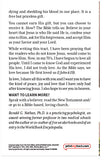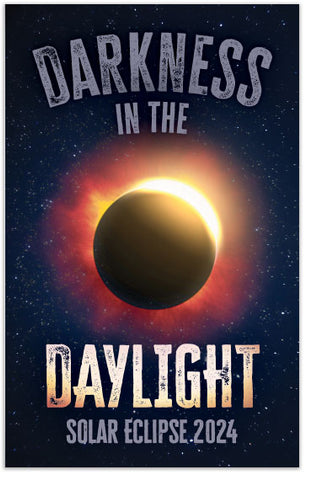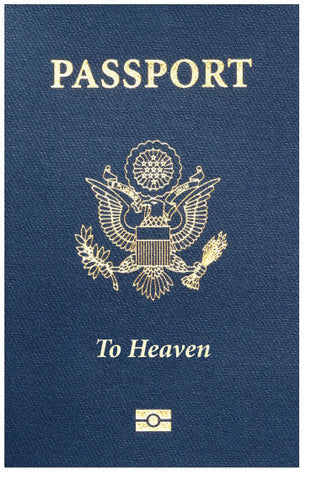What? A Jewish Psychologist Believes in Messiah?
Special-Order Folded Tract
 NOTE: This item is custom-printed to order (click for more details).
NOTE: This item is custom-printed to order (click for more details).
This tract is from our print-on-demand library, and is not kept in stock. Select the options below, and we will custom-print a batch just for you. Because this item is custom-printed, you can add your custom imprint to the back page at no extra cost.
- Estimated shipping date: Thursday, March 26 (Click for more details)
- SKU:
- Discounts: Discount coupons do not apply to this item
- Format: Folded Tract
- Size: 3.5 inches x 5.5 inches
- Pages: 6
- Imprinting: Available with 2 lines of custom text
- Version: NIV
- Returns: Because this item is custom-printed to order, it cannot be returned.
Show all item details
The full text of this tract is shown below in the NIV version. (Do you want to print this tract in a different version than the one listed? Contact us and let us know what you're looking for—we may be able to create the alternate version for you at no charge.)
Hi. I’m Dr. Ron, a psychologist who taught in two medical schools and wrote books. Most psychologists don’t even believe in God. Like most Jews, I was bar mitzvahed and didn’t believe in Jesus as the Messiah (Christ), but I do now.
Do you? In love, I am going to share why I believe because I want the very best for you. If you already believe in Jesus as your Savior, I hope to help you share your belief with your Jewish friends.
What do you imagine first convinced me that Jesus is the Jewish Messiah? It was the fulfillment of the Bible’s 300 predictions about His first coming that loving Christians shared with me.
As you may know, measurable predictions are part of the scientific method and modern psychology. The odds of one man fulfilling just four of the following six prophecies is estimated to be one in 28 quadrillion!
The Proof in the Prophecies
Of course, in science and psychology, we also search for alternative explanations. For example, Jesus was Jewish and knew the prophecies, so did He simply go about fulfilling the 300 predictions? Was He just a persuasive and talented magician? These six prophecies about Jesus’ birth and death defy such an explanation.
Lineage: The Old Testament of the Bible predicted that the Messiah (Christ) was to be from the line of David (2 Samuel 7:12-13 and Jeremiah 23:5-6; 30:9) and he was (Luke 3:23-38).
Birthplace: The Messiah was to be born in the small town of Bethlehem (Micah 5:2-5) and he was (Luke 2:1-7).
Betrayal: The Messiah was to be betrayed for 30 pieces of silver (Zechariah 11:12-13) and he was (Matthew 26:14-16).
Date of death: The Messiah was to enter Jerusalem and die when Jesus died, 483 years after a decree to rebuild Jerusalem (Daniel 9:25-6).
Crucifixion: The Messiah’s death was described in what reads like an eye-witness account of Jesus’ crucifixion (Psalm 22).
Death and Burial: The Messiah was to die among transgressors (Isaiah 53:12) but be buried among the rich (Isaiah 53:9). Jesus died between two thieves and was buried in a rich man’s tomb (Matthew 27:57-60).
Is there only One God? Was the Messiah to be God?
Like most Jews, I grew up hearing, repeating and believing, “Hear, O Israel: The Lord our God, the Lord is one” (Deuteronomy 6:4). If so, how could the Messiah be God?
What helped me was learning that the Hebrew word translated “one” is “echad” which means “unity,” not “singularity.” In addition, the Hebrew word for God in Genesis 1 is “Elohim” which is plural.
Many Jews say that Jesus was not God but a great, moral teacher. Would such a teacher think and say that he is God—“I and the Father are one.” (John 10:30)? If so, he can only be a lunatic, a liar, or the Lord.
A prophesy in the Old Testament reads, “For to us a child is born, to us a son is given, and the government will be on his shoulders. And he will be called Wonderful Counselor, Mighty God, Everlasting Father, Prince of Peace” (Isaiah 9:6).
In Jesus’ first coming, He was not a government leader, so that may have kept the Jews from believing that He was the Messiah, but “Mighty God” confirms that the Messiah was to be God.
What about other Gods & Religions?
I believe that it is important to respect people who choose other spiritual paths. Given the contradictions between religions, however, they cannot all be true.
For example, Jesus cannot be both (a) the Savior of the world who never deceived anyone and who told people to love their enemies (Christianity) and (b) a prophet who is coming back to admit faking death on the cross and to execute non-Muslims (Islam).
If there is anything after this life, we need to learn about it from the most accurate source. Other than the Bible, no other book or person predicts the future with 100% accuracy. The Bible says there is an afterlife, so I believe it. Unfortunately, in the Bible, Jesus said more about hell than heaven. I don’t think you want to go to hell any more than I do. Unlike all other major religions, Christianity says no one is good enough to go to heaven.
How Can You Go to Heaven?
The all-holy God who inspired the Bible requires us to be sinless and holy if we are to be with Him after death. Out of His love for us, however, He provided a solution (before Christ) by having pure animals sacrificed in the temple and their blood covering sins. Then God had a pure, sinless man, Jesus, take the consequences of our sinfulness by dying and shedding his blood in our place. It is a free but priceless gift.
You cannot earn His gift, but you can choose to receive it. How? The Bible tells us: Believe in your heart that Jesus is who He said He is, confess your sins to Him, ask for His forgiveness, and accept Him as your Savior and your Lord.
While writing this tract, I have been praying that the readers who do not know Jesus, would come to know Him. Now, in my 70’s, I have begun to love all people. Until I came to know God and experienced His love, I did not truly love. As the Bible says, we love because He first loved us (1 John 4:19).
In love, I share all this with you and I want you to have the kind of peace, joy and love that I have only had after knowing Jesus. I also hope to see you in heaven.
Want to learn more?
Speak with a believer, read the New Testament and/or go to a Bible-based, loving church.
Ronald G. Nathan, Ph.D. is a practicing psychologist, an award-winning former professor in two medical schools and the author or co-author of five secular books and of an entry in the World Book Encyclopedia.




